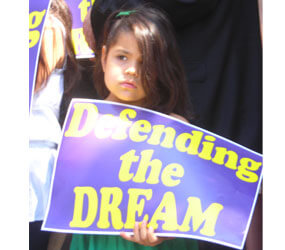Standing side-by-side with other faith leaders at a June 30 press conference, Bishop Mitchell T. Rozanski reiterated the Catholic Church’s support for the Maryland DREAM Act – a controversial law that allows certain undocumented immigrants to receive in-state college tuition.
Speaking at the Episcopal Cathedral of the Incarnation in Baltimore, Bishop Rozanski called the Catholic Church an “immigrant church” – one that has always stood by the side of immigrants.
“For many, this issue is boiled down to absolutes based in laws and economics,” Bishop Rozanski said. “As faith leaders, we care about these factors too, but are compelled always and everywhere to uphold the abiding truths and principles that have guided our faith traditions throughout time.”
Bishop Rozanski, vicar for Hispanics in the archdiocese, acknowledged that upholding those principles is “often not convenient or popular.”
“But the most compelling test of our actions will be the judgment of those who come after us,” he said. “Today, we want to be sure that these young men and women can look back years from now, and know we stood by them, just as our predecessors did for our ancestors who were new to this country, but sought and found comfort and compassion in the leaders of their faith centuries earlier.”
The press conference was held on the same day as the deadline for a referendum petition drive undertaken by law opponents. Referendum supporters said they collected 100,000 signatures within two months – well more than what is needed for a vote.
If enough signatures are verified, the DREAM Act will go before voters in 2012. Catholic leaders had urged Catholics not to sign the petition.
Bishop Rozanski noted that an interdiocesan taskforce has been established to educate Catholics on the issue. Chaired by Washington Auxiliary Bishop Francisco González, the taskforce consists of four members from each of the dioceses whose territories include Maryland – the Archdiocese of Baltimore, the Archdiocese of Washington and the Diocese of Wilmington, Del.
A Facebook page called “Justice for Maryland Immigrants” has also been established by the Maryland Catholic Conference.
“We hope and pray that the people of Maryland will consider the merits of this law with honest minds and open hearts,” Bishop Rozanski said, “and will choose to support it as well.”
Bishop Rozanski said the bishops are “well aware that the issue has inspired strong feelings, in part driven by legitimate concerns about illegal immigration and our state’s economic challenges.”
“We do not condone breaking the law,” he said. “We do believe, however, that the solutions to the problems that exist in our current immigration system do not lie in denying opportunities to young people.”
The DREAM Act allows undocumented immigrants to pay in-state tuition at community colleges. To be eligible, students must have attended Maryland high schools for three years and they or their parents must have paid state income taxes for each of the three years and who will pay for each year in college. Students may transfer to a four-year state college or university at the in-state rate after completing 60 credit hours. Students who are not permanent residents must provide an affidavit stating they will file to become permanent residents within 30 days of becoming eligible to do so.
Gov. Martin J. O’Malley signed it into law this spring with the support of Catholic bishops.
After the June 30 press conference, an undocumented immigrant from Mexico told The Catholic Review that her educational future depends on the DREAM Act.
Brenda, a parishioner of St. Clare in Essex who asked that her last name not be used, graduated from Chesapeake High School in Essex this year with dreams of becoming a teacher. She applied to the Community College of Baltimore County, she said, but the cost at the out-of-state rate is approximately $6,000.
“We want to do better,” said Brenda, who has been living in the United States for eight years and speaks fluent English. “We want to have an education. I don’t know why people say this is about immigration – it’s about education.”
Bishop Angel Nuñez of the Bilingual Christian Church, Baltimore, objected to names used by opponents for children of undocumented immigrants.
“To call our children criminals and lawbreakers is a shame,” he said. “We will not wear that label.”
Others supporting the DREAM Act during the press conference were: The Rev. Hal T. Ley Hayek, dean of Cathedral of the Incarnation; Bishop Douglas Miles of Koinonia Baptist Church in Baltimore and co-chair of Baltimoreans United in Leadership Development; Bishop Eugene Taylor Sutton, Episcopal Diocese of Maryland; Rabbi Gila Ruskin, vice-president, Baltimore Board of Rabbis; and Bishop Marcus Johnson, New Harvest Ministries.


